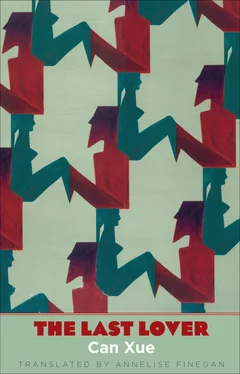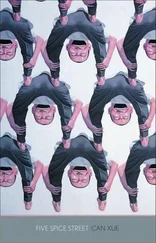Vincent turned and ran into the house. In the large courtyard he saw that everyone had gotten up. They stood at the doors of the rooms watching him. The halls and corridors were lit by pine torches. He couldn’t find the room where he had been sleeping. Every room had changed to look exactly alike. He went in and retreated again, ridiculed the whole time. Later a boy walked up to him, making a sign that he would show him the way. Vincent followed as they rounded one turn after another and at last reached a large chicken coop. All the birds inside were roosters. Once Vincent appeared they started to crow, so loudly even the deaf would have heard. The young boy ran away. Vincent was tired and scared, so he simply stayed in the coop. He didn’t know how it had gotten there, but an old sofa sat in the corner. He fell onto the sofa and went to sleep. There was a kind of extremely small mosquito that bit his skin painfully, but he paid no attention to their bites. In a dream, he marched heroically through cannon fire. Shrapnel bloodied his whole face. Blood ran into his eyes until he couldn’t see anything.
In a fishing village by the sea Vincent came across a man from his own country. He was an elderly tourist. He wrapped his head in a white turban like the local men. This man sat in a wicker chair on the beach every day. They conversed facing the distant waves.
“There are people from our country everywhere here. I don’t think this is by chance,” the old man said.
“I hadn’t thought about it closely.” Vincent felt slightly ashamed. “But you, do you live here? Don’t you intend to go back?”
“I want to pass the last day of my life in this little fishing village.”
The old man’s face revealed a smile. To Vincent, his expression seemed to say that he was the only one who knew the mystery of the way of life in this fishing village, but he didn’t intend to communicate it to Vincent.
Vincent was disheartened because in this boring little place his thoughts were already frozen. During the day everyone went to sea to catch fish. Only a few children and the elderly were left in the village, along with four or five of the women. And at night people went to bed early. Once the moon came out there was no stirring in the village; it was profoundly dark. Yet the old man had adapted to this simple, almost primitive, life. He went to the beach every day and stayed there. Vincent saw him sometimes talking to the seagulls, sometimes exclaiming to the sea, but the better part of the time he sat silently dozing in his wicker chair. Vincent had no way to leave. This place received no messages from the outer world. A long-distance bus came once a month. He could only calm his heart and while away the days. Sometimes he realized that he didn’t remember things and he couldn’t think clearly. It was more or less as if he had been born and raised in the fishing village, a loafer eating the food of idleness. He was still able to indistinctly remember his own past busy life, and remember that Lisa was his wife, but the details of his life were like a kite with a cut string. No matter what he did, he couldn’t remember. One boring day he asked the old man, since he’d been in the village so long, why none of their countrymen had come here. The old man answered him:
“That is because you are here.”
After Vincent returned to his room at the hotel he thought again and again of the old man’s statement, and suddenly he understood it. So in his remaining days Vincent no longer sauntered all over, but instead brought a wicker chair to sit by the sea like the old man. Once the sun came out the two men went to the seaside and sat there until the people who’d gone to sea to fish returned. Halfway through the day a worker from the hotel brought them food.
As they sat idly, the old man seldom spoke. Vincent came to know from a few scanty words each day that the old man was from the northern part of Country A. He’d worked for several decades in a timber mill, and was now retired. He had a wife, children, and grandchildren, a large family. He said he’d received an invitation to come to this fishing village. One of his uncles, his mother’s brother, wrote a letter from here inviting him for a brief visit. Although the whole family was opposed, he came. The day before he arrived his uncle fell ill and died. He was only in time for the funeral. He still remembered his agitated emotions on arriving. He had now lived in the fishing village for two years. Because he had no way to communicate with the outside world, his family might already have forgotten him. He felt that in his family’s eyes this would be a good thing. Sometimes Vincent wanted to talk with the old man about life in Country A, but every time, before he opened his mouth, his mind went blank, and he couldn’t think of anything to say. And the old man immediately saw this, always telling him, “There’s nothing to say, let’s not talk about it.”
When heavy winds blew they had to stay inside the hotel. But the old man had something in his heart he couldn’t let go. He made one trip after another, running outside to look at the sea.
“A stranger may come to find me, a local man. I worry about missing him.” When he said this to Vincent, Vincent thought of him on the shore, waiting.
One night at midnight the old man knocked anxiously on the door of his room. Vincent opened the door and saw him standing outside in his pajamas.
“Can you be my witness?”
“What’s the matter?” Vincent already vaguely sensed what it was.
“I need a witness. I’m afraid people will forget me in the same way I fear death.”
“Let me think a bit.”
“So you can’t make up your mind. I need to wait for you to make up your mind.”
He looked a little disappointed. Vincent didn’t know how to console him.
After daybreak, when they met once again at the seaside to sit together, the old man told Vincent that the visit in the night had only been a moment’s impulse. Now his mood was tempered. He shouldn’t be so hasty, he should “let the flow of water make its own channel.” That day a boat arrived. When the boat came, the old man glanced at it with drowsy eyes, then lowered his head, mumbling about something. Vincent guessed what the old man was saying. He felt his heart brought closer and closer to the old man’s.
The atmosphere in the fishing village seemed primed for something to happen very soon. Day followed day, and no one took notice of the two men. Most of the villagers just stood at a distance observing, none of them ever displaying excessive interest. And news from the outer world never reached here. The boats always sped past in a hurry, so that they could not see who was on the deck. When the sea breeze blew through the old man’s white beard, Vincent noticed that his face became more and more expressionless, like a mask. Vincent couldn’t help thinking, Was the coming event happening inside the old man?
He arrived. He came at noon, rowing a small wooden boat over from the coral island. The man was probably a little over forty. He had a face a little like a spider. He was holding a leather bag in his hands. He used the language of Vincent’s country to explain that his leather bag was filled with “precious blood.” The old man stood up from the wicker chair. Vincent noticed his relief, as if he were putting down a heavy load. He realized that the old man wanted to free himself.
They were to set off on a journey. The old man eyed Vincent with a questioning gaze. Vincent opened his mouth and said, “Yes, I saw. I remember.”
In the bright sunlight the fishing village began to seethe with excitement because news arrived that someone had died in an accident.
After the old man was gone Vincent stayed in the fishing village by himself. Every day he went to the beach. Facing the sea, the sky, the blowing wind, he also unconsciously pondered this matter of “witness.” Who could be his witness? Could the ignorant villagers count as his witnesses? Could the wife whose husband had died count as his witness? Could the young boy over there picking up crabs by the sea count as his witness? That there was no true witness proved his time still hadn’t come. Vincent began to long anxiously for the long-distance bus.
Читать дальше












